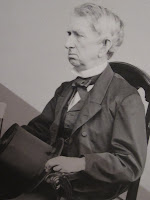 |
| Lincoln's Inauguration in 1861 |
Abraham Lincoln, one of our most revered presidents, worked hard to keep our nation together. Even before he became president, emotions were running high in Congress and across the nation. The issue of slavery had not only split the country in half, but it was pitting family members against each other. A state could not enter the union without first declaring itself as Free or Slave. This caused many problems for new states. Kansas was one state where blood was shed in the name of freedom. It was not that people did not know slavery was wrong and should be abolished, it was Southern's fear of letting go of the economy that had made them wealthy. They had convinced themselves they were right - that slaves were necessary. One man saw there was no getting around it any more - slavery had to be abolished or the country was going to destroy itself over slavery. Abraham Lincoln's bravery in standing up against adversity kept our nation together. Even when states began to secede, he refused to let them go without a fight.
At the start of his term as president he surrounded himself with men of varying viewpoints. Although he was a Republican, he put Democrats and Whigs in his cabinet.
Hannibal Hamlin - his Vice President. Our 15th Vice President, he was the first Republican Vice President. He was the Governor of Maine before he became the vice president. He was opposed to slavery and provided a balance to the ticket for election in the 1860 election. He supported Lincoln's Emancipation Proclamation.
William Seward - the Secretary of State. He was strongly opposed to slavery. He opened his home to runaway slaves during the 1850s. He even ran for president during the 1860 election. Although he did not win, he was selected to be part of Lincoln's cabinet. He helped keep foreign powers from becoming involved in the war. He survived an assassination attack during the same time the conspirators killed President Lincoln.
Montgomery Blair - the Postmaster General - he was a lawyer from Maryland and his family owned slaves. He was against slavery and very vocal about his feelings. Even though he was a Democrat, Lincoln asked him to be part of his cabinet. He instituted free city delivery, a money order system, and the use of railway cars to deliver mail.
Caleb Smith - the Secretary of the Interior - hailed from Indiana and became the first person to hold a cabinet position from that state. Lincoln rewarded his work on his campaign by giving him this position. His health was failing and he really did not want the job, instead wanting to be assigned to the Supreme Court. He resigns in 1862 and his assistant - John P. Usher takes over.
Salmon P. Chase - the Secretary of the Treasury -started the Free Soil Movement and Party - where Free Soil, Free Labor, Free Men became his slogan. He ran for president in 1860 but only received 49 votes. He supported Abraham Lincoln. In hopes of stopping the war, he was part of the Peace Convention in 1860. He helped establish a national banking system and a national paper money system. He started the "greenback" currency we are all so familiar with today. He actually appeared on the $10,000 bill from 1928-1946.
Simon Cameron - the Secretary of War - was also a candidate for the presidency in 1860 from Pennsylvania. He supported Lincoln when he did not get the nomination. Unfortunately, he only served for one year before having to resign. During the Civil War he spent time as the ambassador to Russia. He was succeeded by Edwin Stanton.
Edward Bates - the Attorney General - became a Republican when the Whig party broke apart. He was the first cabinet member to come from a state west of the Mississippi. He helped Lincoln with his war policies such as arresting southern sympathizers and seditious northerners. He disagreed with Lincoln's emancipation and recruiting African Americans into the armed forces. He was nominated to the Supreme Court in 1864 and took the job.
Gideon Welles - the Secretary of the Navy - was born in Connecticut. He helped build up the Navy to blockade the South. He also started the Medal of Honor award. He also helped to implement the "Anaconda Plan" which put a stranglehold on the South by blockading all ports.
At the outset of the Civil War, these men advised President Lincoln. Fort Sumter began a war that would rock our nation. In Charleston Harbor, South Carolina,a ship bringing supplies to soldiers holed up at the fort was fired up.










No comments:
Post a Comment